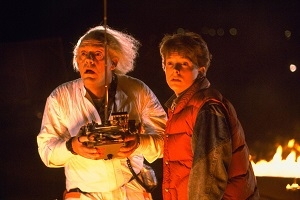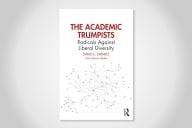You have /5 articles left.
Sign up for a free account or log in.

Wikipedia
ATLANTA -- David Hochfelder, associate professor of history at the State University of New York at Albany, plans on introducing a new iteration of an undergraduate course this semester with an image: a 2012 cover of the Massachusetts Institute of Technology Review featuring astronaut and Apollo 11 veteran Buzz Aldrin. It’s captioned, “You promised me Mars colonies. Instead, I got Facebook.”
It’s a provocative statement, and perhaps a perfect hook for Hochfelder’s course, called History and the Future. The course is inspired in part by the Teach the Future foundation, directed by Peter Bishop, a retired associate professor of sociology and former director of the Foresight program for future studies at the University of Houston. The foundation promotes training students in high schools, colleges and universities to think about the future in a variety of disciplines. The idea is to make all disciplines more relevant to students’ lives, as well to better prepare them for what’s ahead.
At the recent annual gathering of the American Historical Association in Atlanta, Bishop, Hochfelder and other proponents of teaching the future argued that historians are particularly suited to these kinds of questions (as well as how the National Aeronautics and Space Administration took a backseat to Silicon Valley in the public imagination) and that there may even be a moral imperative to adopt the approach.
"You’re looking at one direction on the timeline, and we’re looking at another direction on the timeline,” Bishop said. “When I describe this to people, they say, ‘You can’t teach the future because it happened yet,’ and I say, ‘Well, you can’t teach the past, because it doesn’t exist, either.’ We’re all working on the same order of phenomena.”
David J. Staley, an associate professor of history at Ohio State University and a part-time futures consultant, agreed, saying that “one of the biggest hang-ups historians will have is, ‘We can’t predict the future, we shouldn’t predict the future.’ It’s a kind of uncertainty, so there’s skepticism and almost a timidity, about venturing a prediction, so we just don’t do it.”
But Staley’s work -- inspired by Peter Schwartz’s Art of the Long View: Planning for the Future in an Uncertain World and its notion of scenario planning as a qualitative method for learning about the future -- centers on the idea that such thinking is actually the historical method, in reverse.
“We can use the historical method -- whatever our specialization -- to train our attention toward the future,” he said. “And my claim isn’t just that historians [can do this because they] study the past. How we look at the past is what matters.”
Rather than simplifying phenomena to basic models and theories, historians already work within complex systems and are relatively comfortable dealing in uncertainties, he said.
Bishop said that those in other, obviously futures-oriented fields, such as economics, tend to work with more linear, extrapolative techniques than do historians. But with the current speed of information and rate of world change -- what some have called “exponential time” -- the future is assured to be “turbulent," he said. And students need more nuanced ways of preparing for it.
Moreover, students should be asked to think about the future on a more regular basis, Bishop added. “If we’re preparing students for the future, shouldn’t we be telling them a little bit about the future they’re going towards?”
Of course, Bishop and others said, historians work with artifacts, documents and other evidence that those studying and teaching the future lack. Teach the Future acknowledges that what’s ahead is fundamentally unknowable, but offers templates and models for helping instructors help their students think about the future in more rigorous and systematic ways than what is simply intuitive. It also crowdsources effective models and teaching materials from like-minded instructors. Staley said that looking for metapatterns in the history of the topic at hand -- whether it’s climate change or global security or fashion -- as well as analogies can be helpful in thinking about the future, too.
So how does teaching the future look, in practice? Hochfelder, of Albany, crafted his new course around several big questions, such as how historians can be relevant in today’s policy debates, how historical thinking can enhance citizenship, and how historical methods and skills can be applied to analyze probable futures and help create preferred outcomes. Students select a topic of interest that they analyze for possible futures in the beginning of the semester -- anything from technology to religion -- and create an annotated bibliography for sources of information about that topic. (The Economist, for example, was high on panelists’ futures reading list.)
Students then begin a semester-long “scanning blog” to help track developments and trends, and generally bridge -- to the extent possible -- the evidence gap they have in predicting the future of that topic. Students eventually complete a trend analysis identifying and assessing the major drivers of change in their subject area, noting how those drivers interact and which are likely to further drive or inhibit change. The final project is an eight-to-10-page paper on how the topic might evolve over the next five, 10 or 50 years. Students are asked to identify their preferred outcomes, as well as one unexpected “black swan” scenario with a disproportionate effect on the topic.
Hochfelder said his institution -- like many others -- has made 21st-century challenges a major curricular initiative, but that most related undergraduate courses are decidedly 20th-century oriented. So the idea for his course (which is based on several similar courses he taught previously) was to create something “resolutely” futures oriented. Additionally, he said, his administration wants to promote the history major as one that instills workforce-ready skills, such as critical thinking, in its graduates.
And personally, he said, he’s never believed in “studying the past for the past’s own sake.”
“I guess that makes me presentist, and I’m OK with that,” Hochfelder said, noting he’s regularly disturbed by the prevalence of short-term thinking in society in general. “The major rationale for studying history is to figure out how we got here, and if we answer that question, if we have that mind-set, the very next question is, ‘So where are we going after this?’”
All panelists said that asking students to think about how the past will shape the future was a way to make dry course content relevant to their students. But the exercise can be decidedly psychological, said Joe Sears, a high school history teacher at the private Emery/Weiner School, in Houston.
“My students are very pessimistic about the future -- I don’t know if that’s a product of The Hunger Games or something,” he said, to audience laughter. (What followed was several minutes of humorous audience commentary about how movies about the future tend to feature dystopia, or at least major U.S. cities -- Los Angeles in particular -- being destroyed.)
Bishop agreed, saying he thought pessimism about the global future was also attributable the 24-hour news cycle, bad news traveling fast over the Internet and a general media overload. Yet he also noted what he called a “disconnect” between students’ feelings about the global future -- generally gloomy -- and their own personal futures, which they tend to envision as bright.
Beyond helping prepare students for the future, talking about it can give students a sense of empowerment they might not otherwise develop. All panelists stressed that the idea behind teaching the future isn’t to promote courses entirely on the topic. Rather, they said, any teaching about the future is a step in the right direction.
Those in the audience included an environmental historian focused on climate change and a professor at the National Defense University who asked whether the military might be too concerned with the future of technology over other matters (to which panelists replied that people in general are, probably due to the fact that it's tangible and relevant to their everyday lives). Bishop warned them that beginning to teach the future likely means encountering skepticism from colleagues.
He traced that skepticism back to the ancient world, in which futures were divined in ways that are much less rigorous than what he proposes.
“Frankly, I don’t think we’ve let that go,” Bishop said. But the Greeks didn't get it all wrong, he added. “Historia” to them didn't simply mean history, but rather, learning or knowing by inquiry.









